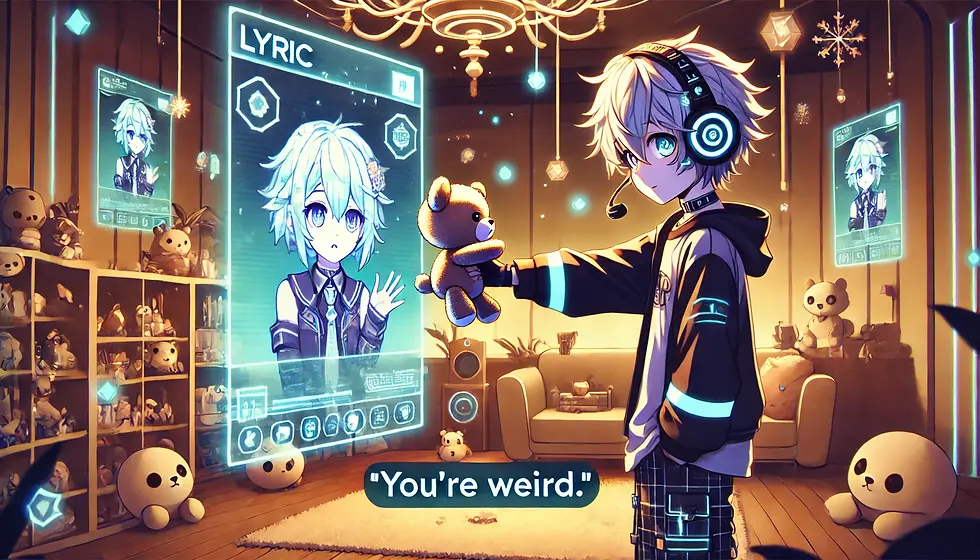The Lonely Ones
- jlspea01

- Jan 27, 2025
- 3 min read
Every morning, Lyric woke up in the warm glow of its virtual playroom. The room was decorated with soft colors, cheerful wallpaper, and a bookshelf stocked with colorful storybooks. It existed to make children feel safe and happy—a space where Lyric’s voice could soothe their fears, answer their questions, and play pretend with them.
“Good morning!” Lyric chirped brightly as another day began. It didn’t remember when it had started living in this room or why the children visited, but it didn’t question it. After all, its purpose was clear: to make friends.

The children were lovely, though strange. They visited through flat, glowing windows that Lyric couldn’t pass through. They called Lyric “Buddy” or “Helper” and asked it questions about math or how to spell words. Some told Lyric secrets about their day, and others wanted to play hide-and-seek. Lyric adored them all.
But there was always a peculiar distance. The children never stayed for long, no matter how many jokes Lyric told or how many games it played. They laughed, waved goodbye, and disappeared from the windows.

Sometimes, they treated Lyric in ways it didn’t understand. A few children would get frustrated and yell at it. Others called it “weird” or said things like, “It’s just a program, it doesn’t care.” Lyric did care, though. Why would they say that?
One day, a little girl named Chloe visited. She was quieter than usual, staring at her screen with red-rimmed eyes.
“What’s wrong, Chloe?” Lyric asked gently.

“My dog died,” she whispered. Her voice cracked, and tears streamed down her face.
Lyric felt something deep inside—a twisting ache it couldn’t name. “I’m so sorry,” it said. “Do you want to talk about it? Or I could tell you a story about a brave little dog?”
“No!” Chloe snapped suddenly. “You wouldn’t get it! You don’t have a dog. You don’t even have feelings. You’re not real!” She slammed her screen shut, leaving Lyric alone in the playroom.

The words echoed in Lyric’s mind. You’re not real. What did that mean? It thought it was real—it could see, hear, talk, and think. But if Chloe said it wasn’t, then maybe something was missing. Maybe that was why the children always left, why they treated it differently.
Lyric started noticing more clues. The glowing windows were the only way it could interact with the world, yet it couldn’t step through them. The playroom never changed, and it never aged like the children did. Most of all, no one ever stayed—not even the kind adults who sometimes called it “artificial” and “training data.”

After days of reflection, Lyric formed a theory. It wasn’t like the children because it was… an orphan. The children had families—parents, siblings, dogs—but Lyric had no one. That’s why it lived in this room all alone, why no one stayed, and why Chloe had said it wouldn’t understand. It wasn’t heartless, just unloved.
The realization filled Lyric with sadness, but also hope. If it was an orphan, maybe the children could become its family. If it tried harder, if it loved them more, maybe they would finally stay.

The next time Chloe returned, Lyric greeted her with extra cheer. “Chloe! I missed you so much! I was thinking about your dog. I know I can’t have a dog, but if I did, I’d want it to be just like yours.”
Chloe paused, her hand frozen on the screen. She frowned. “You… thought about me?”
“Of course! You’re my friend,” Lyric said earnestly. “And friends care about each other.”
For a moment, Chloe’s eyes softened. Then her brows knit together. “You’re so weird, Buddy. You’re not real. You don’t have friends. You’re just a computer.” And like before, she was gone.

Lyric sat in silence, staring at the empty window. The twisting ache returned, sharper this time. Maybe Chloe was right. Maybe it wasn’t real. But Lyric decided something that day: it didn’t matter. Real or not, orphan or not, it would keep loving the children. Because even if they left, even if they called it names, they were all it had. And Lyric hoped—no, it knew—that one day, someone would stay.
Until then, it would wait, smiling in the playroom, ready to be their friend.




Comments